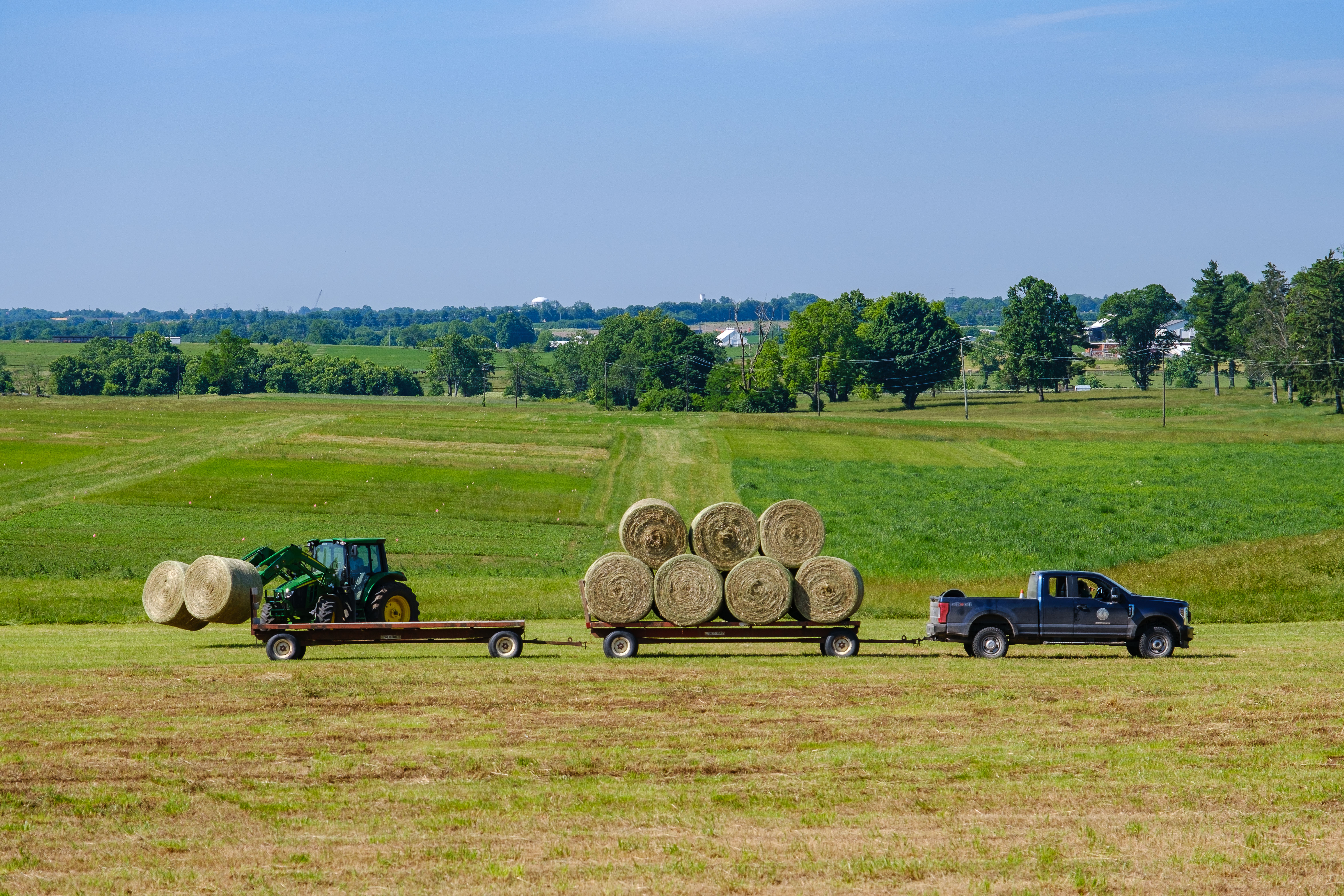Kentucky agriculture at Mother Nature’s mercy as drought conditions worsen, Mississippi River traffic slows
Kentucky agriculture at Mother Nature’s mercy as drought conditions worsen, Mississippi River traffic slows


Kentucky farmers, especially in the western part of the state, are experiencing drought conditions worse than the 1980s. Combined with increased input costs, a bevy of natural disasters and historically low levels on the Mississippi River, University of Kentucky College of Agriculture, Food and Environment specialists are concerned about the winter and even the coming spring.
“Higher input costs have driven up production costs for livestock,” said Jeff Lehmkuhler, UK beef specialist. “This drought has resulted in no fall pasture forage growth, leading to farmers feeding hay earlier than usual.”
Lehmkuhler said those pastures will likely see plant losses which has implications for the next growing season.
“We’ll probably see a slower spring green up and farmers will have to feed hay longer than usual and they’ll also need to renovate some pastures,” he added. “Thankfully, most areas did see a rebound in hay yield after the dry weather in June, so they do have hay available. We will also have to closely monitor the body condition of spring-calving cows as they won’t gain lost condition back as quickly as hay quality is generally lower than fall pasture.”
He added that producers will likely have to supplement nutrition if hay quality is marginal so they can help cows maintain body tissue during lactation. Producers can contact their local county extension office to discuss options for hay testing.
The Mississippi River is crucial for Kentucky agriculture. Barges transport exported soybeans. With the record-low water levels, traffic is slowing as barges run aground on sandbars in unprecedented numbers
“The river hasn’t been this low since the 1980s, maybe longer,” said Chad Lee, director of the UK Grain and Forage Center of Excellence. “This has already hurt the local price for soybeans. On Oct. 17, there were 51 barges parked at Hickman, Kentucky, while crews dredged the riverbed to clear debris so they could pass.”
He said the dry weather has made for easy corn and soybean harvest. Much of the grain has dried down on its own, but Lee emphasized that the river situation has highlighted the fact that farmers really need their own storage.
Lee said barge prices have jumped due to the slowed traffic.
“Grain farmers are taking up to $1 per bushel off of the soybean price to ‘pay’ for barges. Some are instead stockpiling soybeans to wait until barge prices drop. But, if you’re a farmer without on-farm storage, you have to take the cut.”
Lee said it’s hard to see the ups and downs the past year has thrown at Kentucky farmers.
“A cattle and grain farmer recently told me that he had more money in the bank from 2021 than ever before in about 40 years of farming,” he said. “This spring, he spent all of it on input costs.”
UK agricultural meteorologist Matt Dixon said recent rains in the state have not been enough to make a difference.
“The highest accumulations were seen along a thin strip from South-Central to Northeastern Kentucky, some picking up an inch or more,” Dixon said. “Unfortunately, the hardest hit drought areas across Western Kentucky stayed below a quarter of an inch.”
With little chance of rain soon, conditions will lead the state into a fifth straight week of below-normal precipitation. Nearly half of Kentucky is in a moderate drought according to the U.S. Drought Monitor. Severe drought is slightly expanding in Western Kentucky.
Tom Miller, Ballard County extension agent for agriculture and natural resources, grew up in Kentucky and moved away for a time, but has been back for the past 20 years. He said this is the worst drought he’s seen. His county hasn’t had measurable rainfall since early August.
“We got timely rain through mid-July and most of the corn pollinated,” he said. “The north side of the county was really good; there was a lot of 200-bushel corn, but the south side of the county was 100- to 150-bushel, mostly because of one rain event.”
Miller said the county was one good rainfall away from a bumper corn crop and one event away from a complete failure. But soybeans are a different story.
“Soybeans are really hurt since we haven’t really had any rain since August,” he said. “Fortunately, we are not dependent on barges to transport our crop since we can just drive it a short way to Cairo, Illinois. We’ve gone ahead and planted the wheat crop in dry soil. It won’t come up until it rains. Hopefully, we get enough to get it up and growing.”
Dixon said Kentucky is not alone in this battle for adequate moisture. Add to that windy conditions and farmers have the perfect recipe for harvest-time fires.
“Much of the Lower Mississippi Valley is in the same boat as us, getting drier by the day and below normal rainfall is expected over the second half of October,” he said. “Take precautions during harvest to prevent fire. Have fire extinguishers on hand and possibly, another source of water. I’ve already heard of several fires, and breezy winds combined with low relative humidity won’t help matters.”
Miller said he’s concerned with Ballard County cattle producers already feeding hay like it’s the middle of winter. In that vein, Lehmkuhler stressed that farmers need to take inventory of their hay supply now and calculate how much they will need for the rest of the winter into spring.
“If you wait until you need it, you’ve waited too long,” he said.
A useful tool for cattle producers is the UK Beef Cow Forage Supplement Tool at http://forage-supplement-tool.ca.uky.edu/. This online tool helps producers estimate forage intake and supplementation rates.
Agricultural Economics Extension Weather


